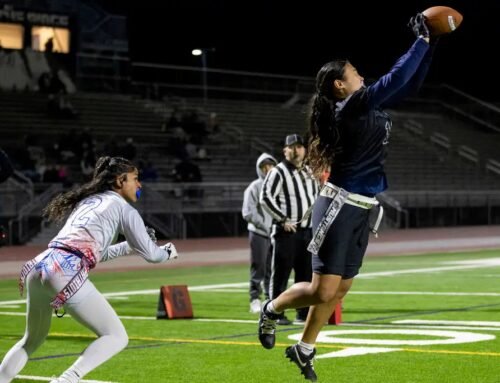Perhaps the biggest takeaway from the latest filing in the bitter legal dispute between the Western region’s top two collegiate conferences is that the Mountain West is ready to play offense.
The Mountain West is the defendant in the case and had largely remained the more passive side, but it came out swinging in Thursday’s filing in a California court.
Part of that was simply the nature of the legal timeline. An answer was due to the Pac-12’s claims that an agreement between the conferences to pay $55 million in poaching fees for taking five schools from the Mountain West was unenforceable and illegal.
But the 86-page document went above and beyond a simple response. The Mountain West made several counterclaims that included allegations of promissory fraud and breach of contract.
The Mountain West presented claims that the Pac-12 entered into the agreement knowing it planned to raid the MW of its best teams with no intention to pay fees it was agreeing to for such a maneuver. To that end, the MW asserts a plan to take its top few teams to replace any departing Pac-12 members dated to 2023.
That plan was eventually put into action, suggesting it was never the Pac-12’s intention to enter good-faith negotiations about a potential merger, as was prescribed in the scheduling agreement between the leagues that included these poaching fees. According to the filing, the departing Mountain West schools maintained an influence in the conference and worked against the league’s interest while already having agreed to move on to the Pac-12. That would be truly damning if proven.
It even includes receipts, particularly from the Utah State administration, of saying the quiet part out loud and admitting that part of the plan.
Those comments look pretty sloppy in retrospect and gives the Mountain West yet another path to a potential legal victory.
But the Mountain West wasn’t done.
No intention to pay
The league further alleges that not only did the Pac-12 sign the agreement knowing it would eventually raid the Mountain West’s top teams but also committed fraud by knowing it would do so while having no intention to pay the prescribed penalty. The true scheme, according to the filing, was to essentially crumble the Mountain West so there would be no entity to pay.
Sure, the per-game fees for the 2024 season were exorbitant. But the games were booked late and took one conference game away from each of the Mountain West schools, upsetting several football coaches. There is a fee to be paid for that.
Reading the Mountain West’s filing, one would think the league has a slam dunk case and the Pac-12 should pay up. Just like after the Pac-12 filed the initial suit and anyone who read it without knowing the full details of the case could have easily been left to believe it was right and should be absolved of having to cough up the cash.
That’s the nature of most court cases like this. The lawyers lay out their side of the argument, and the numbers can be misleading.
It’s tough to say who is going to win the case. That’s anybody’s guess, and lawyers consulted by the Review-Journal expressed opinions on both sides.
But the Mountain West feels like the correct common sense side in the fight even if the law eventually disagrees on a technicality.
The scheduling agreement offered a lifeline to Oregon State and Washington State, the two remaining Pac-12 schools. They needed football games, and the Mountain West made it happen, but only after the Pac-12 agreed to several guardrails to protect the MW from what eventually happened anyway.
‘Trojan horse’ strategy
The Pac-12 argues that represents duress and should void the deal. That might be true in the eyes of the law.
But the Mountain West isn’t going to go down without a fight. It says the Pac-12 knew what it was getting into when it signed the deal.
It also refers to the Pac-12’s decision to sign the agreement and take advantage of its benefits without paying the price as a “Trojan horse” strategy.
The Mountain West proved it has ammunition in this fight, which means it could go on for a long time. The notion of the Pac-12 using the suit as a stalling tactic to try to avoid paying long enough to financially bleed out the Mountain West ignores the MW’s right to withhold payments to the departing schools for media rights, which they have started to exercise.
Basically, this isn’t ending any time soon, and it’s difficult to predict which side will succeed in court.
Even if the question of which side is in the right is a bit more clear.
Contact Adam Hill at ahill@reviewjournal.com. Follow @AdamHillLVRJ on X.






Leave A Comment